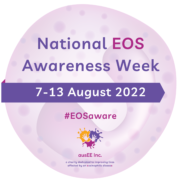This national EOS Awareness Week (7-13 August 2022), ausEE is shining a light on eosinophilic (EOS) diseases and the impact they have on the those living with them.
Eosinophilic gastrointestinal diseases (EGIDs) are chronic inflammatory diseases whereby eosinophils (a type of white blood cell) build up in the gastrointestinal tract causing inflammation and tissue damage, 1 often in response to food and/or airborne allergens.
Founder and CEO of ausEE Inc, Sarah Gray, Sunshine Coast, Queensland, started the peak national support and patient advocacy organisation after her daughter, Bella was diagnosed with eosinophilic oesophagitis (EoE) at 18 months of age.
EoE is the most known type of EGID affecting 1 in 2,000 people. The elevated eosinophils occur in the oesophagus. As such, symptoms of EoE include trouble swallowing, regurgitation of food, nausea, vomiting, reflux, stomach or chest pain or food getting stuck in the oesophagus.
Bella’s first symptoms appeared at four months of age, when she began to ‘fail to thrive’. After visiting several GPs and pediatricians, she was eventually referred to a gastroenterologist for an endoscopy with suspected coeliac disease. Bella was subsequently diagnosed with EoE at 18 months old.
Unfortunately, the diagnosis of EoE is often difficult and delayed. If left untreated, around 30-50 per cent of those with EoE will require emergency treatment for food impaction (food stuck in the food pipe) which can result in permanent scarring and narrowing of the oesophagus.3
Over time, Bella has grown acutely aware of her eating habits, and has consistently struggled to maintain sufficient nutrition to successfully fuel her ongoing health and energy requirements.
“My fear of food has resulted in anxiety – a problem with which I have battled for most of my life.
“The severity of my EoE episodes, and the uncertainty of when they will occur, makes me feel uncomfortable when socialising, given people tend to socialise around food,” said Bella.
Now 18 years old, Bella has trialed a litany of medications and treatment plans, including a gruelling, four-year-long trial with a feeding tube.
There is no cure for EGIDs, and the most common treatment option is an elimination diet. The top 8 common food allergens include:
- Milk
- Egg
- Soy
- Wheat
- Peanuts
- Tree nuts
- Shellfish
- Fish
Learning to live with food restrictions can take a physical, emotional, and social toll on those living with EGIDs, which is why ausEE has issued the Top 8 Challenge this national EOS week.
By avoiding these Top 8 foods for 24hrs, you can help raise awareness of the impact of EGIDs and show support for the Australians living with these debilitating diseases.
Find out more about NEOSW and support EGID medical research at www.eosaware.com.
To learn more about EGIDs and EoE, and to access free support, please visit www.ausee.org.




